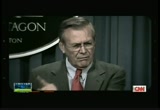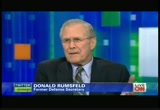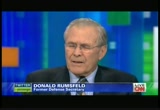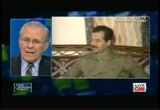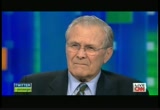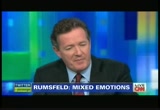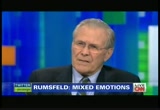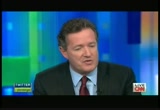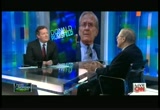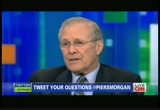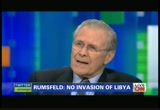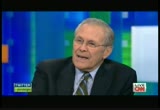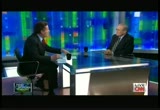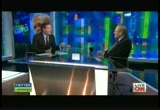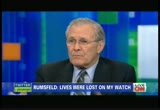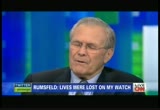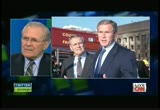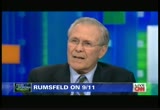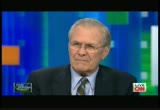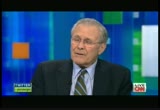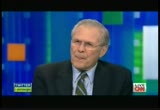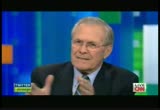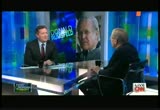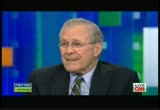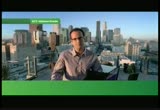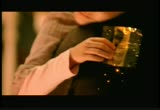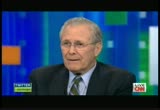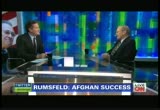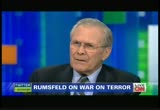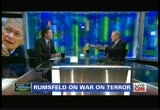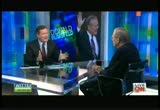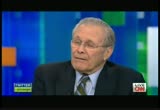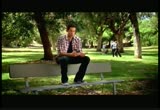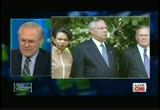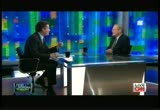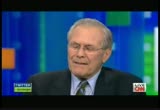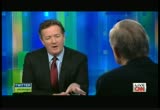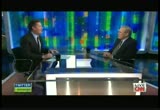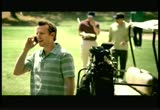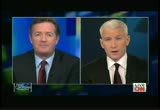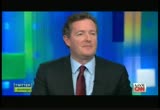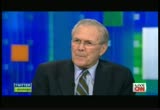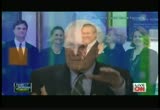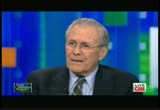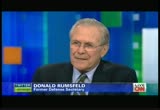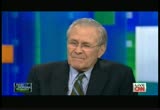tv Piers Morgan Tonight CNN March 8, 2011 9:00pm-10:00pm EST
9:00 pm
e.d. and will, thanks for being here. thanks for joining us "in the arena." piers morgan starts right now. tonight -- >> i, donald h. rumsfeld -- >> secretary of defense to two presidents, the man at the center of every major decision of the bush administration, rumsfeld on iraq, weapons of mass destruction, and the aftermath of two wars. >> there are known kboenowns, te are known unknowns, that is to
9:01 pm
say we know there are thing we know. and there are unknown unknowns, things we don't know we don't know. >> that is then, this is now. donald rumsfeld in his own words. this is "piers morgan tonight." mr. secretary, welcome. thank you for coming in. i want to start probably obviously with libya, extraordinary scenes involving muammar gadhafi who, he pitched up at a hotel in tripoli, said nothing to reporter. just came in and left soon afterwards. seeing the pictures now, bizarre scenes. you were a middle east envoy for the united states. when you see what's going on, not just in libya now but also in the middle east, do you quite believe it? >> well, you can. i mean, you think of the growing population, the large number of unemployed, mostly young people,
9:02 pm
and i guess it's not surprising that people now today they have facebook and twitter and cable television and they can see the opportunities that exist in other countries. and they know in their circumstance that isn't the case. it's not surprising that there would be that momentum. >> the quandary if i was an american watching what's happening in the middle east now, given american foreign policy through the period that you were in the administration and what's been going on since, it's confusing to put it mildly to work out what the bad guys are and who the good guys are. do you accept that? do you accept that there's a kind of odd mixed message coming out? is saddam a good or bad guy? one time he was a good guy. another time we had to get rid of him. gadhafi. similar story. you know, mubarak, similar story. what should an american be thinking right now about these characters? >> i don't know that i would lump mubarak with saddam hussein
9:03 pm
or gadhafi. a much different cut. >> much different? >> yes, indeed. i would say so. think of saddam hussein. he killed hundreds of thousands of his own people. he used chemical weapons on his own people and he invaded and started war with iran and invaded kuwait. he was a brutal, brutal, brutal, vicious dictator. gadhafi. you can see what he is about. now the plus on gadhafi was that after he saw what happened to saddam hussein, he decided he didn't want to be saddam hussein and gave up his nuclear program. we would be in a worse situation today if he had nuclear weapons. >> there was a famous bit of footage of you meeting saddam hussein in the '80s. when you see this, do you feel uncomfortable when you watch it? >> no, not at all. president reagan and secretary of state shultz and i talked and made a decision that he was in a war with iran. and that it was -- he did not
9:04 pm
have diplomatic relations with them since the middle east war, and that it might make sense to reach out. in fact, diplomatic relations were re-established during the reagan administration. shortly after my visit. it's too bad. it makes me wonder how he might have taken a different turn in his life, and been a better leader for his country and -- and he wasn't. it turned out bad for him, unfortunately. >> when you see the way that the middle east is evolving through revolution from the ground up, from the people, driven by these people who are younger, they're better educated, they're frustrated, they're not happy with the they that their lives are being ruled by dictators and they're getting rid of them. when you see that happening organ organically, does a part of you think it's a better way to go? that if america waited, something like iraq, a similar thing would have happened there and you would have avoided the
9:05 pm
bloodshed and the controversy which reading your fascinating book, you know it's stained many reputations. iraq in particular. when you see tunisia, egypt, libya, do you not wish you'd wade perhaps? >> i think quite the contrary iraq. he's a man who killed hundred of thousands of his own people. the burial grounds are just filled with mass graves. the chances of a popular revolt overthrowing the saddam hussein regime, i think, is very modest. he is -- was a vicious dictator, and i think he would have put it down viciously. now what you're seeing in other places is something quite different. the other hand, what you do have mixed emotions in this sense, you think of the cedar revolution in lebanon and who's in charge there, hezbollah, a terrorist organization, that is not representative of the major fraction of the population. you worry in these other countries, who knows what's going to happen in libya if in fact gadhafi is thrown out.
9:06 pm
who knows what's going to happen in egypt? >> there is an argument, and i have heard this espoused by family members of mine who served with the british military in iraq and afghanistan. that it's a moot point whether iraq is necessarily a better place now for the iraqi people. there are still appalling outrages every day, there are bombings in baghdad all the time, killing tens, hundreds of people. the oppression is continuing in a different guise to many of them. you know, it is a moot point. it's hard to argue iraq has been a glorious victory. >> people would characterize it that way. i think what they would say is the iraqi people have a chance for a much better future than they were living under. >> are they getting it? >> well, sure, there's a free press. they have a parliament. they have a constitution they fashioned themselves. >> but is the quality of -- >> the economy is growing rapidly. >> but is the quality of their lives actually that much -- >> in large fractions of the country, yes, without question. with the saddam hussein regime gone, there is no question but
9:07 pm
that iraq is a better place today. and the region is a better place today. now, is it -- are there killings, yes. that's true. and is it a bumpy road? look at the united states. we think of our country the way it is today, but we had slaves into the 1800s, we had a vicious civil war. we -- women didn't vote into the 19 unhundreds. getting from where they were to where they were heading is not a smooth road, it's a bumpy road, and it's tough. no one can do it for them. they have to do. but they've been given a chance. they have an opportunity. >> in term of slavery, america made that decision itself to deal with that. it was an internal issue for america to deal with. the difference was w someoith se iraq is america going in and deciding to dictate -- >> a couple of dozen countries -- >> i would agree with great britain, at the forefront with
9:08 pm
tony blair. in terms of the alli allies inv a country and dictating on them a lifestyle, a freedom and democracy, that perhaps many don't really want, for argument's sake. and the reason i put this to you is we had defense secretary gates who said any future defense secretary who advises the president to again send a big american land army into asia or the middle east or africa should have his head examined. as general macarthur delicately put it. blunt stuff. >> i think he's right. no country does anything like that lightly. and i am -- i wasn't the president, and -- but i'm sure it was a terribly difficult decision for him. and the process went on over a period of many, many years, in the 1990s the congress voted for a regime change and plot signed it. it went back to the congress and
9:09 pm
voted overwhelming -- went to the united nations, 17 resolutions. you absolutely do not do anything like that lightly. it's a very, very serious, important step. >> when you see gadhafi going, when you see potentially the house of sal being threatened, when you see this complete transformation in the middle east, do you feel excited or feel at hence birthday what might happen -- apprehensive what might be? >> both. if you were in israeli and looked at what's happening, their circumstance is very much in jeopardy, without question. now i look at it and we know that the natural state of man is to want to be free and to have choices. and to have opportunities. many people in that part of the world don't. we also know that if -- we said what happened in lebanon, same thing happened in iran. there was a popular revolution, and who's in charge?
9:10 pm
a small group of ayatollahs. you could have the same thing in egypt, libya. the muslim brotherhood could be much smaller in term of total population, but very disciplined, organized, ambitious. >> and that would be a threat to the united states if that happened. >> oh, my goodness, yes. >> so if you take that as a potential scenario, if you were now in the administration, still defense secretary, would you be considering now an invasion of libya because that would be the way to stop potentially what happened in iran happening in libya? >> no, i wouldn't. i think that -- that it -- it would not necessarily be a way to stop that. in the last analysis, the people of those countries have to make their own choices. i see all kinds of discussion about a no-fly zone right now, and i think secretary gates is correct that that's a complicated thing to do. we had no-fly zones with the british and the french in iraq
9:11 pm
for years. and our planes were shot at, over 2,000 times. >> here's what i would just -- why is it different for the people of libya? why are we leaving them to be massacred by gadhafi in ever-growing numbers when you stepped in in iraq, we agree that both saddam and gadhafi are bad guys. why are the people of libya being left to die? >> because there was broad, uniform, almost undebatable agreement that there was a risk of stockpiles of weapons of mass destruction in the case of iraq. >> slightly disingenuous? >> no, let me finish -- >> there's a -- >> let me finish. >> you finish, and i'll come back and decide if it was disingenuous or not. >> good. terrific. you'll decide what you think -- >> maybe. >> yeah. what happened was that everyone agreed, the u.n., that he had stockpiles. everyone agreed he had used weapons of mass destruction, and when it was all over, the report
9:12 pm
concluded that in fact he had the people in place, he had the precursors, he had the dual-use facilities, and he had the ability in a matter of weeks to have weapons of mass destruction, chemical and biological. now that is all fact. and that is quite different. gadhafi gave up his nuclear program. >> yes. the one fact you've left out is that -- the war was fought not on a prete tectext of regime chn which in itself could have been an arguable point -- >> in iraq? it was regime change -- >> it was fought on the pretext that he had weapons of mass destruction. >> that was one of the reasons. >> it was. the main reason -- >> the congress had voted regime change in the 19 points 90, and president clinton signed it. >> if is that why iraq happened, would you have been very happy to have gone in regardless of the wmd snohomish. >> -- wmd issue? >> no. >> i don't follow that argument. >> it was the rejection of the u.n. 17 times. was the behavior on his own
9:13 pm
people. it was the weapons of mass destruction -- >> if you wouldn't have invaded him without the wmd issue -- you said you wouldn't have done that -- then the only reason you did invade was because of wmd. >> no. the reason the president made the decision to invade was the combination of those things. what he might have decided if one piece was missing or out, i can't answer for him. >> did you have any regrets? >> of course you have regrets. my goodness, you can't -- anyone, a president, a secretary of defense, anyone involved in government when a war takes place -- >> every commanding officer they say in military -- >> people die. >> i was going to say every commanding officer -- >> let me answer the question. people die, they get wounded. each life is precious. each life is important. and you cannot be involved in anything like that and not come away without thinking of that every single they lives are lost. >> every commanding officer they say, every military man always says that they can cite mistakes they made which directly cost
9:14 pm
lives. you were a commanding officer in the war, in effect -- >> civilian. >> yeah, but a commanding officer. which mistakes do you think you made which directly cost lives? >> cost lives? well, there's so many pieces of the thing that it's hard to -- lives were lost on my watch. and you carry that with you -- >> but in that specific case? that's what every military guy will tell you. >> someone on the ground could tell you something like that. at my level it would have been, you know, having a commander who shouldn't have been there. or something at that level, decision. i'll give you an example. the -- to my amazement, general sanchez's headquarters was staffed at about a 37% level when it should have been staffed at 100% level. he had made his request, they'd been approved by the army, been approved by the joint staff, and the army and the joint staff did
9:15 pm
not get the thing done. and that obviously was abu ghraib was one of the things that resulted in my view. >> we'll come back to abu ghraib. >> yeah? >> have there been times during that period when you've shed tears over american troops? >> oh, my goodness. we visit battlefield hospitals, i would, and joyce and i would go to the bethesda and the walter reed hospital, and you'd ask yourself, what in the world can i do to help them understand how much their sacrifice has been appreciated. and you meet with the families of those that have fallen. and i almost invariably came out inspired by the patriotism and dedication and the desire of those wounded troops to get back to their unit. and the pride they have in what they've done. you know, it's -- i was -- was around when we had an all-volunteer military. and the difference in mood of
9:16 pm
military people where they all are volunteers and decided that's what they wanted to do and what occurred back in the vietnam war era and the korean war era, it's a totally different military today. and they're amazing people. >> take a short break. when we come back, i want to take you back to 9/11, to the day that really changed everything. and go everywhere. to help revitalize a neighborhood in massachusetts, restore a historic landmark in harlem, fund a local business in chicago, expand green energy initiatives in seattle. because when you're giving, lending and investing in more communities across the country, more opportunities happen. move our families forward. move us all to a better place.
9:17 pm
and caltrate moves us. caltrate knows 80% of us don't get the calcium we need. and when we don't, our bodies steal it from our bones. caltrate helps put it back. with 1200 mg of calcium and 800 iu of vitamin d. women need caltrate. caltrate helps women keep moving because women move the world. [ male announcer ] the future of mobile computing starts now. the new motorola xoom. powered by the latest android technology with lightning-fast performance -- it's everything the tablet should be. her morning begins with arthritis pain. that's a coffee and two pills. the afternoon tour begins with more pain and more pills.
9:18 pm
the evening guests arrive. back to sore knees. back to more pills. the day is done but hang on... her doctor recommended aleve. just 2 pills can keep arthritis pain away all day with fewer pills than tylenol. this is lara who chose 2 aleve and fewer pills for a day free of pain. and get the all day pain relief of aleve in liquid gels. we're with you when you're saving for your dreams. [ woman ] when you want a bank that travels with you. with you when you're ready for the next move. [ male announcer ] now that wells fargo and wachovia have come together, what's in it for you? unprecedented strength, the stability of the leading community bank in the nation and with 12,000 atms and thousands of branches, we're with you in more ways and places than ever before. with you when you want the most from your bank. [ male announcer ] wells fargo. together we'll go far.
9:19 pm
secretary rumsfeld, i want to take you back to the events of 9/11. obviously a pivotal moment for america, for the world, but for you. you've been in office just a few months, since january of that year. suddenly you're propelled into this completely unprecedented situation. and had i read your book, it's interesting -- rather like reading president bush's book. i think it's always important in these things to get the context of the human side of this, which is that you guys are sitting there being faced with the worst attack in the history of morning a city like new york. and trying to understand how you deal with that and how you cope with the pressure, not just of the event but also of the demands of the american public for some kind of retribution for what had happened.
9:20 pm
where were you the moment you heard? >> i was in my office, having breakfast next door with a group of congressmen when the plane hit the world trade center tower, the first one. and then i'd gone into my office and was getting a cia briefing from my briefer, and the second plane hit. then shortly thereafter, the pentagon was hit. >> was what your first thought? >> accident. with the first plane, i thought it was an accident. >> the second -- >> second one, it was no longer an accident. >> who did your dput tell ygut s responsible? >> didn't have a gut feeling. george tenant called later and said they had reasonable verification at that stage from an intercept that it was al qaeda. but at that moment, i just knew we'd been attacked, then our building was hit, and it wasn't so much a question of who did it, it was a question of what do you do now that our building's burning and people are dead. it was a heartbreaking thing to have people in -- in the
9:21 pm
pentagon there. they were bringing bodies out in the grass, and trying to save lives. >> and these were people that you've worked with, that you knew personal? >> well, yes, indeed. they were part of the pentagon family. and it was -- to see that building, the symbol of american military power, burning and people pulling bodies out, it was a heartbreaking thing. as you suggested, there was no guidebook, roadmap, anything to see this is what you do. >> an interesting -- you had drawn up before rumsfeld's rules. and it was targeted at being chief of staff at the white house. and fascinating document that you -- you made up. i got a couple of things from this which i thought were relevant. the most relevant one i felt for the decisionmaking that followed then when was you said it's easy to get something than to get out of it. indeed. >> which is a prescient remark.
9:22 pm
the decisions will reverberate today, for 20, 30, 100 years, maybe more. the biggest decisions taken by any american officials possibly in my lifetime. when you go back to that period, reading the book, a picture i would say of confusion, of differences of opinion, of some people being stronger characters, others being weaken. you -- you hold no punch with some of the colleagues you've been working with. is that a fair portrayal that i'm painting here? was it confused? is it always going to be confused in a situation like that? >> i think when something happens like that, there's a period where you have to sort it out. you used the word retribution, and i heard others use it. and i -- i argued again that. i don't think it was a matter of retaliation or retribution. the task was how do we defend the united states of america? how do we defend the american people? a terrorist can attack at any time, at any place using any
9:23 pm
technique. and you can't defend everywhere at every moment of the day or night. >> but the strikes on afghanistan and the later invasion of iraq, they were retributions, as well. there's no other way of describing it. >> there is another way and i wouldn't use the word retaliation or retribution at all. that was not the point of it. >> wasn't it important for america to strike back at somebody? didn't you have to do that for the soul of your country? >> well, let me respond. my view was that we had to protect the american people. how do you do that? i talk about it in the book, what you do is you if after the terrorists wherever they are, and you put pressure on. and you make everything they do harder. you make it harder to raise money. harder to recruit. harder to move. harder to communicate. and you also make it awkward for the people that are hosting the terrorists like the taliban, in the case of afghanistan. and that was the assignment. it was not to punish or arrest or retaliate or make yourself
9:24 pm
feel good. it was to protect the american people. >> the decision to go after bin laden and to go into afghanistan and try and get him and dismantle al qaeda is obvious. they were the people who committed the atrocitiy. what was much less obvious to people was why the administration felt this burning desire to go after saddam. >> uh-huh. >> and that remains, as you know, a hugely controversial decision. what was the simple answer? why does d saddid saddam -- why saddam have to be muddled into this? why are we doing this, why are we going after the guy who didn't appear to have anything to do with 9/11? >> to go back just one second. i have a web site, rumsfeld.com, and in it i -- before 9/11 even occurred in march, i fashioned a document that i wrote about guidelines for using military force. and they go way beyond what you
9:25 pm
suggested from rumsfeld's rules. i hope you'll look at it. i think it lays out the complications, the defendants, the dangers, the risks, and it's terribly important. the answer to your question is before 9/11, the -- iraq of the only country in the world shooting at our airplanes every day. and i mentioned earlier the various things that had occurred previously. iraq was very much on the radar screen, not as a country to invade but as a country that was causing the united states and the world problems and dangers and shooting at the airplanes. so we were discussing an iraq policy well before 9/11. i'd written memos on this, and suggested not that we invade them -- >> would america have gone to war with saddam without 9/11? >> i havy in idea. >> would you -- i have no idea. >> would you have liked it? >> it depends on risk factors. it's a complicated question. >> i would throw it back, the argument about saddam remains exactly the same -- >> yes, it does.
9:26 pm
>> regardless of 9/11. >> i think the odds are the president would have. >> wouldn't it be a definite yes? wouldn't your answer be an unequivocal -- >> he's the one who makes decisions -- >> that's a copout, isn't it? >> no, i said it's yes -- as i write in the book -- >> i haven't got him in front of me, i've got you. >> yeah. >> what i'm curious is any equivocation on your point about 9/11. it seemed the argument, the reason for going to war with saddam -- 9/11 of irrelevant. this guy was either -- >> no -- >> armed and dangerous -- >> no. wait a minute, he'd been on the terrorist list for the state department for years. he was giving $25,000 to the families of suicide bombers. he had al zarqawi in the country, the al qaeda leader. don't suggest that he was totally disconnected from terrorism because he wasn't. >> no, i meant disconnected from 9/11. >> okay, fair enough. >> the original question i put to you -- >> that's fair enough. >> should the world have gone to war despite 9/11? i expected a firm, unequivocal
9:27 pm
yes. >> yes, i think that would have been the decision. i can't say that for the president. >> if you'd of been president you would have -- >> i think that's probably right. yep. i wasn't there, and i'm not president. but i think you're probably right. >> going to take another short break. when we come back, i want to take you to the next stage, which is when america went to war. can a trading site help make you a sharper trader? mine can. td ameritrade can. they've got trading specialists i can call for help. and paper trading. free practice trading that helps me hone my technique. complex options.
9:28 pm
and free tutorials. online or in person. can a trading site really make a difference? if it can't, why are you trading there? number one in online equity trades: td ameritrade. trade commission-free for 30 days, plus get up to $500 when you open an account. and here's what we did today in homes all across america: we created the electricity that powered the alarm clocks and brewed the coffee. we heated the bathwater and gave kelly a cleaner ride to school. cooked the cube steaks and steamed the veggies. entertained dad, and mom, and a neighbor or two. kept watch on the house when they slept. and tomorrow we could do even more. we're cleaner, domestic, abundant and ready now. we're america's natural gas. the smarter power today. learn more at anga.us. [ male announcer ] there's just something about werther's caramel that makes a chocolate so smooth and creamy, you don't just taste it, you feel it. ♪ magic [ male announcer ] werther's original caramel chocolate.
9:30 pm
secretary rumsfeld, let's turn to afghanistan. at the time, the december 11 briefing just before we began the offensive, you said that the primary u.s. goal was quite simply to capture or kill all al qaeda. clearly that has not been achieved yet. how far do you think we have got? >> we don't have any metric to measure it because if you think about it they're recruiting all the time, they're raising money, they're plotting and planning, and trying to find ways that they can kill innocent men,
9:31 pm
women, and children. we know that we're putting pressure on them, and capturing and killing a number. but the relationship between how fast they're recruiting and how fast we're killing or capturing is something that we just -- metrics don't exist. >> was it a mistake to label this a war on terror? >> i think so. i think so. >> i thought it was such a f factuous title. the military -- i come from a big military family. they need to know who they're fighting, and they need to know how they're going to win and then declare victory if that's achievable. you can never win again terror. it doesn't exist as an entity. >> exactly. it's a technique, a method. the purpose of terrorism is to terrorize. >> did you argue again it at the time? >> i did. i talk about that in the book, and i discuss it -- >> why were you overruled? >> well, i wasn't overruled, there was a discussion, and people had different views -- >> the opposite they went -- >> i was not the president. the president was the president. >> i know, but why did he overrule you? >> well, i don't know -- his
9:32 pm
several prboblems with the phrase. one, a war. sounded like the real task was for the department of defense. in fact, it's a competition of ideas, and it's much more than -- you're not going to win it with bullets alone. it's going to take more than bullet to prevail against terrorism. and second, terrorism is a technique, and what we're really engaged in was a -- a competition of ideas with -- with violent extremists, with radical islamist. >> the battle in afghanistan has moved quite some time ago from being a conventional war to a battle against a terrorist organization having the capacity to train on the ground in afghanistan and to -- to commit further atrocities. it's really a counterterrorism operation, isn't it? >> exactly. >> it's no longer a war, is it? >> afternoon -- i think that the word war is imperfect because it leaves people with the impression of world war i, world war ii, it begins, it ends. this is much more like the cold war where there was a competition over a sustained
9:33 pm
period of time of ideas against communism, in the case of the cold war. and -- >> is america safer today, do you think? >> oh, you bet. absolutely. >> even with all the instability in the middle east? >> would anyone ever have dreamt that we'd be close it a decade without a successful attack in the united states? i want to be ratcheted back to an earlier comment, and it's related to this. shortly after 9/11, i went to visit soltan kaboos and describe this in the book. the thing he said to me was 9/11 -- and it's a shocking thing to say. he said, 9/11 may very well be a blessing in disguise. and i said, how so? and he said, look, and this is -- connects afghanistan and iraq. he said because a -- 3,000 people were killed. he said if weapons of mass destruction are used, this may wake up the world, america and the world to the danger where not 3,000 people could be killed but 300,000, or three million people could be killed.
9:34 pm
and at the time when this was going on, when you wanted to disconnect iraq and afghanistan and 9/11, this was going on, there was this dark winter study by johns hopkins that talked about putting small pox in three locations in our country. and a million people end up dying. so there is a real -- the lethality of weapons today is so much greater, and if you marry that -- the realty of the lethality of the -- >> i understand the point, let me throw one back at you. there's not a way of spinning this -- thwhich is that the thrt of increased by iraq. i think there are several reasons you could argue that successfully. one is that america clearly didn't win the wraar in iraq. it wasn't a victory in the common send. there's still mayhem on the ground there every day. if you're iran, you're watching and thinking, interesting, the number-one superpower in the world has failed to do a
9:35 pm
convincing military victory here. and that emboldens enemies. it gives them more strength than they might have otherwise had. and secondly, there's no doubt that although there was no link with al qaeda at the time of 9/11, certainly a large link now with al qaeda-related groups in places like iraq, particularly in places like pakistan, which is becoming more dangerous by the day. but actually the number of people attaching themselves to al qaeda who are now terrorists has increased quite dramatically since the invasion of iraq. so i don't think it's -- it's the rosy picture you might be painting. >> first of all, i'm not painting a rosy picture. i can't imagine how you would characterize what i've said as a rosy picture. it is a very untidy world we live in, a dangerous world. and there are people being killed in many countries every day. that's not rosy. it's dangerous. and it's dangerous for us. it's dangerous for nation states, it's dangerous for
9:36 pm
people who believe in freedom and free systems and opportunity. and who don't want to live their lives in bunkers, it is a dangerous place. >> where is bin laden? >> who knows? if we knew, they'd capture or kill him. >> isn't it extraordinary that the world's greatest military force can't find a guy on a horse? >> no. look, the -- the fbi's most wanted list, people stay on there for years and years. i can tell you this -- he's very busy hiding. he is having trouble doing everything he has to do. he's having trouble raising money, having trouble talking on a phone, he's having trouble staying where he is. he has to move around frequently. and -- >> you think he still alive? >> i do. don't know, but i suspect he is. and i suspect he may very well be in pakistan. but who knows? if you knew, you'd go get him. >> when we come back, i want to talk to but what you really thought of your colleagues. it's quite spicy stuff. our points from chase sapphire preferred
9:37 pm
are worth 25% more on travel. we're like forget florida, we're going on a safari. so we're on the serengeti, and seth finds a really big bone. we're talking huge. they dig it up, put it in the natural history museum and we get to name it. sethasauraus. really. your points from chase sapphire preferred are worth 25% more on travel? means better vacations. that's incredible. believe it...with chase sapphire preferred your points are worth 25% more on travel when booked through ultimate rewards.
9:38 pm
but you can still refinance to a fixed rate as low as 4.75% at lendingtree.com. plus, get the best deal or we'll pay you $1,000. call lending tree at... today. but now, to get it really cooking, you need a little website development. some transparent reporting, so you know it's working. online ads and 1-on-1 marketing consultation. yellowbook's got all that. yellowbook360 has a whole spectrum of tools. the perfect recipe for success. visit yellowbook360.com and go beyond yellow. it's personal. i have diabetes. so i'm proud to manufacture the accu-chek aviva meters and test strips here in the usa. and now we put a prescription discount card in every box
9:39 pm
9:40 pm
secretary rumsfeld, one of the more fascinating aspect of the book is it's healthfully score settling. >> it's not at all. >> you say all these people are lovely but -- and there's always a but with quite a few, which i admire honesty. but condoleezza rice for example, you say she's bright and academic, but that she had no military experience. and was indecisive. >> i didn't say she was
9:41 pm
indecisive. >> you said -- gives the impression of that. >> no, i said some things didn't get decided. >> that's the same thing, isn't it? >> no, it's not. she was the assistant to the president for national security affairs. maybe she was doing exactly what the president wanted. >> so maybe it was him that was indecise sniff. >> -- indecisive? >> conceivably. i don't know -- he's the president, the man who was elected, and you go back in history -- think of george shultz and cap weinberger, and you think of brzezinski and kissinger and roger -- and there's something about the institutions, the way the decisions -- first of all, the only ones that get to the president are complicated, they're tough and big. and the institutions have different thing they look at. and it's not surprising when they get to the national security council that they -- they're their are differing views. >> is part of the problem -- >> that's fine. >> is part of the problem for
9:42 pm
you guys, from that administratio administration at that time that it was so controversial -- >> what was contentious? >> it decisions that you took collectively? >> they're tough decisions, you bet. >> because they were so polarizing these decisions, that inevitably there's been an extended blame game ever since? >> i don't think there has been. >> but there has, hasn't there? >> no. >> you don't think so? >> not too much, no. compared to other administrations? >> you're in public life a heck of a long time before iraq came along, for example. >> right. >> part of -- it comes off a little bit in the book, i wouldn't say it's a bitter book because it's not, but there are flashes of bitterness, i think. and i get why you feel that way. is it that you feel perhaps you've been stained by iraq? that you don't want your legacy to be iraq, that you feel like you've had all this public service, it's going to come down to donald rumsfeld, you know, most reviled politician in american history. you know the stuff you've read about yourself. does part of you feel -- i wish i hadn't -- >> no.
9:43 pm
you know, at 78 years old, the last thing i think about is something like that. what i think about is what can i do -- i think of what a great country we have, what wonderful opportunity i've had to serve. and my slice of history, i felt, needed to be there. so i took four years. and i didn't just write from memory. a created a web site and put thousands of documents out so people could actually go back and see how the decisions were made. >> i ask people on twitter earlier, i know you're on twitter, as well, for questions for you to see what they would throw up. if you still want to put some minutes in on -- let me know. quite a few said ask him directly, does he sleep well at night. >> i do. i do. and i hope that the book would suggest to people that public service is a good thing to do. and people need to do it. and they -- hope they'll go to the speech by adelaid stevenson about public service that i heard as a senior in college. >> the big regret you express in the book is about aback to you
9:44 pm
grab. -- abu ghraib. i was curious because there's no expression of regret in my view for the bigger stuff like the incredible loss of life in iraq -- >> there is indeed a great deal of sensitivity about that. >> but not a hand-holding i'm sorry, which is what but over aback to you gra-- abu ghraib. >> you mean sorry about the loss of life? >> no, the decision making. >> i don't think pa that peopeod in the war on terror died in vain. i think they didn't. i think they've served their country and served stlauvalues are important and have every right to be proud. abu ghraib bothered me greatly because happened on my watch. it stained the united states military. it clearly gave ammunition to the enemy to go out and recruit and raise money against the united states. and it was -- i believe in
9:45 pm
accountability, which is the reason i submitted my resignation twice. >> curious about that. if you submit your resignation and he doesn't accept it, can't you just resign anyway? >> you could. >> do you wish you had? >> i think in retrospect at the time, i felt very reluctant to walk -- our country was in a war, to walk away from it when the president tells you he doesn't want you to is a hard thing to do. i felt it was the right thing to resign, and i felt it was right for the president, i felt it was right for the department of defense and right for me. and so i did it twice. and -- but to walk away when he says you shouldn't and you feel like you've got people out in war zones defending the country. i felt uncomfortable doing that. >> we'll take another break. when we come back, i want to talk to but what richard nicotine one called you. what alarming phrase. >> no. o radio, it's savings, on the radio. gecko: kate frll, it a yours. ka: i'shopping for my o radio, it's savings, on the first car..
9:46 pm
gecko: nice! i do hopchse geit i bet yod great in a bl ofcar.h... atol is th kate: no...actually, i'm torn between a fuel-injected inline-6 and a higher torque quandary!esel.cko: yeahq um in course you could save either way. save you 15% or more on car insue. curtis: yeah but is one of them blue? cause i'd go with the blue one. anr: gei
9:47 pm
9:48 pm
tdd# 1-800-345-2550 no "here's how your money's doing." tdd# 1-800-345-2550 i mean what about a little sign that you're still interested? tdd# 1-800-345-2550 come on, surprise me! tdd# 1-800-345-2550 [ male announcer ] a go-to person to help you get started. tdd# 1-800-345-2550 regular detailed analysis of your portfolio. tdd# 1-800-345-2550 for a whole lot of extras at no extra charge, tdd# 1-800-345-2550 talk to chuck. tdd# 1-800-345-2550 this is mary... who has a million things to pick up each month on top of her prescriptions. so she was thrilled that her walgreens pharmacist recommended a 3-month supply and would always be there to answer questions about her health. now mary gets 3 refills in one and for 3 months, she's done. more or less. ask your pharmacist about a 90 day supply and get a free gift. walgreens. there's a way to stay well.
9:49 pm
back with donald rumsfeld. my colleague, anderson cooper, what have you got on your show tonight? >> tonight, the latest from libya, gadhafi's forces seem to be gaining the upperhand at least in the battle for the city of zawiya. poorly armed forces under fire in the surrounded city. reporters aren't allowed, they've been panned by the government. gadhafi continues to give false statements about what is happening on the ground there. one team from britain's skynews snuck? days ago and witnessed an ambulance being fired upon by government forces and saw children and civilian wounded in the attack. [ explosions ] >> a doctor telling cnn that gadhafi forces fatally shot two fellow doctors, were shooting wounded civilians rather than allowing them to be treated. the assault is being led by the special forces blowing into one of gadhafi's sons. we'll have the latest from the ground. also tonight, digging deeper on gadhafi's family. how he's used his nine kids to cement his grip on power. those stories, a lot more at the top of the hour. >> anderson, thank you very
9:50 pm
much, indeed. back to secretary rumsfeld. it's -- odd things it you emerged from this book. someone that you always liked to work standing up. >> that's not odd. >> it's very odd. >> it's not. it's perfectly normal. >> it's not normal. >> i wonder why people sit down all the time. >> i don't know in history that has worked standing up. >> there's all kinds of naval officers that worked standing up. thomas jefferson had a standup desk. >> and you stand at your desk? >> i do. why do you act like that's odd? >> it's weird. >> it's not weird at all. sitting is weird. i can't imagine why you do it. >> sitting is not weird. you still get up at 4:30 in the morning to do your workout. >> i do. >> you're 78 years old. didn't it dawn on you to take a rest? >> no. why would one want to do it. >> you get up earlier than
9:51 pm
condoleezza rice. >> she's a pianist. >> she gets up at ak a.m. >> sometimes i get up at 5:00. >> and you do a proper workout? >> no, it's not proper at 78. you do what youdo. some weights, a little bit of stuff, read the paper in the sauna. >> what's been the human toll on you, do you think, from all that time you had in office, particularly through the very difficult years of the early part of the century? >> oh, goodness. i don't think of things like that. i don't think of the human toll. i've got -- >> on you physically or emotionally. >> i've got a titanium right hip and right shoulder and i still play squash. so no, i've got a wonderful wife and three kids and seven grand children. >> on 9/11, you didn't call your wife? >> of course it's true. i put it in the book i didn't call.
9:52 pm
torrey clark said, have you called mrs. r.? i said no. she said you son of a bitch. i said you may have a point. >> why didn't you? >> i was busy, goodness gracious. they were still pulling people out of the building. it was a terrible, tragic day for our country. she knew where i was. she's terrific. she's lived with me for 56 years now. >> would you describe her as long suffering? >> no. but when people say how could you stay married to him for 56 years, she says, he travels a lot. >> there's a conflict between personal and professional when you talk about your son and he had this terrible drug addiction, which was raging at the same time you've got these things going on at work. what was it like for you, trying to juggle the two things? >> drug addiction is such a
9:53 pm
terrible, terribly difficult thing and it's heartbreaking to see a human being you love go down and down and down. fortunately, he today is in a good recovery, and has a wonderful wife and children and life's good. but at the time it does on for months and months and months and missing and gone and you just think, my goodness, what's happened? what's happened? where is he? >> did you think you had lost him? >> oh, yeah, sure. there were certain times. then you would get hopeful and then let down again. so there's so many families that go through this. >> when you see what's happening with charlie sheen and you obviously -- martin sheen his father feels helpless about the situation, any advice you can give someone when a son just won't listen? >> i guess the only thing you can say is hope. you can be hopeful, because there are -- you know, enormous
9:54 pm
numbers of people in this country who are in good recoveries, who go through these kinds of things and survive, not easily, close calls to be sure. but they survive. and it's heart breaking to see it. but on the other hand, you can see these recoveries and it's a miracle, it's a blessing. and it's also something that people can be hopeful about, i think, to know that there are people like that that have gone through these times. >> when we come back, i want to talk to you about your political heroes. if you live for performance, upgrade to castrol edge advanced synthetic oil. it outperforms in the world's toughest industry tests. castrol edge.
9:55 pm
it's more than just oil. it's liquid engineering. vo: it's time for a phone... to save us from our phones. new windows phone. now for a limited time get a samsung focus for $99.99, at at&t. [ man ] ♪ trouble ♪ trouble, trouble trouble, trouble ♪ ♪ trouble been doggin' my soul ♪ since the day i was born
9:56 pm
9:57 pm
9:58 pm
wounded. joyce and i decided we have so much respect for them and the service they provide our family, it's what we wanted to do. >> richard nixon apparently once described you as a ruthless little bastard. >> oh, sometimes he overspoke. >> was he right? >> oh, no, no. you've seen some of his expletives deleted. >> who have all the people in here are fascinating? you've served under four presidents. who are your political heroes? >> i had respect for most of the people that i've worked with. >> i think respect is one thing. people you thought were politically heroic? >> clearly, george w. bush, after 9/11, stepped up and led this country and put in place a structure that has protected the american people for close to a decade. >> that structure was the
9:59 pm
incredible toll on american service member's lives and civilian casualties. >> if you think about it, the obama administration has today this week announced they're keeping in police military commissions, indefinite detention and guantanamo bay, which has been criticized unfairly, terribly unfairly. so he deserves a lot of credit for his leadership. gerald ford, when you think about what he did, he came in never having run for president or vice president and a terrible economy, the vietnam war ending, watergate staining the integrity of the white house. and he healed the country. he was such a fine, decent human being that he provided the leadership that was needed at that moment. >> if you were to summarize yourself, would you say you're a dove or a hawk? >> i'm neither.
96 Views
IN COLLECTIONS
CNN Television Archive
Television Archive  Television Archive News Search Service
Television Archive News Search Service  The Chin Grimes TV News Archive
The Chin Grimes TV News Archive 
Uploaded by TV Archive on

 Live Music Archive
Live Music Archive Librivox Free Audio
Librivox Free Audio Metropolitan Museum
Metropolitan Museum Cleveland Museum of Art
Cleveland Museum of Art Internet Arcade
Internet Arcade Console Living Room
Console Living Room Books to Borrow
Books to Borrow Open Library
Open Library TV News
TV News Understanding 9/11
Understanding 9/11
